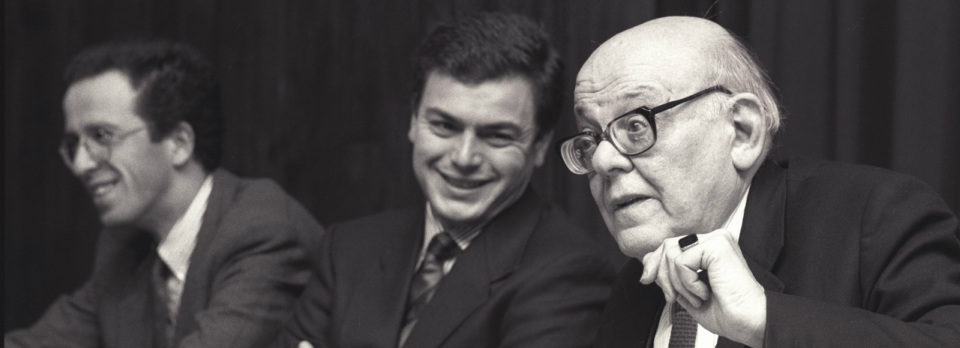
Who Is Leonardo Polo?
Leonardo Polo (1926-2013) is a renowned Spanish philosopher best known for his philosophical method called the abandonment of the mental limit and for the profound philosophical implications and results of the application of this method, especially his proposal of a transcendental anthropology.
Leonardo Polo's philosophical work can be inserted within the recurring questions of the last few centuries regarding freedom as transcendental and of its relation to earlier perennial or classical philosophy. It is here that Polo's historical significance lies insofar as he boldly proposes a methodology that opens the way for a metaphysics of freedom or, better said, a theory of the person that responds to the concerns of modern and contemporary philosophy and which continues and expands the achievements of classical and medieval philosophy (especially Thomas Aquinas’ real distinction between esse and essentia). What Polo proposes is a transcendental anthropology and the methodology that makes this possible is the abandonment of the mental limit.
Polo's methodology of the abandonment of the mental limit consists of detecting the mental limit in conditions such that it can be abandoned.
The methodology of the abandonment of the mental limit opens up four major thematic fields:
1) the act of being of the physical universe (metaphysics);
2) the quadruple con-causality (or essence) of the physical universe (philosophy of nature);
3) the act of being of the human person (transcendental anthropology);
4) the manifestation of the human person through her essence (anthropology of human essence).
In addition to this, his works cover a wide range of fields including psychology, theory of knowledge, physics, biology, neuroscience, ethics, philosophy of language, theology, sociology, education, philosophy of science, political economy and business ethics.
The various dimensions of his methodology of the abandonment of the mental limit open up a wide variety of challenges that Polo grapples with throughout his numerous works. His major works include early works such as Access to Being (1964) and Being I (1966), and then later his four volume Course on the Theory of Knowledge (1984-1996). It is however in Transcendental Anthropology I: the Human Person (1999) and in Transcendental Anthropology II: the Human Essence (2003) (English translation on-going) that his philosophical proposal reaches it culmination.
Throughout his works, Polo engages with both classical and medieval thinkers such as Plato, Aristotle, Augustine, Thomas Aquinas, and William of Ockham, as well as modern and contemporary philosophers such as Descartes, Kant, Hegel, Marx, Freud, Heidegger, Nietzsche, Wittgenstein, and Habermas.
In dialogue with the great thinkers of the history of philosophy, Polo seeks to further the achievements of traditional philosophy as well as rectify and correct the project of Modern philosophy.
Thus, for example, in his proposal for a transcendental anthropology, Leonardo Polo distinguishes the subject matter and methodology of metaphysics from that of anthropology. That is, if metaphysics concentrates its attention on the act of being of the universe, anthropology seeks to attain knowledge of the act of being of the human person, which is distinct from that of the extra-mental universe. With this distinction, Polo elevates anthropology to a first philosophy without downplaying the importance of metaphysics or watering it down. As part of this proposed transcendental anthropology, Polo expands upon Aquinas's real distinction between act of being (esse) and essence and applies it to the being of the human person. The result is the expansion of the medieval metaphysical doctrine of the transcendentals to include anthropological transcendentals such as co-existence, transcendental freedom, personal intellect, and personal donal love. At the same time, he offers a correction to modern philosophy's attempts at presenting freedom as transcendental.
Leonardo Polo's philosophical production includes forty-five published books as well as a large number of still unpublished works. Already during his lifetime, interest in his philosophy had given rise to numerous conferences and study workshops, including several international congresses; the publication of more than twenty books and two hundred scholarly articles; dozens of doctoral dissertations; and two philosophical Journals dedicated specially to his thought. Translation of his works from Spanish has begun in various languages including Italian, English, German, Portuguese, and Polish.
For a brief overview of Leonardo Polo's intellectual trajectory, see our Biography section.
A more extensive introduction to Polo's distinction between metaphysics and transcendental anthropology may be found in “The Transcendental Distinction Between Anthropology and Metaphysics”, an article written by Salvador Piá Tarrazona and first published in the American Catholic Philosophical Quarterly in 2003.